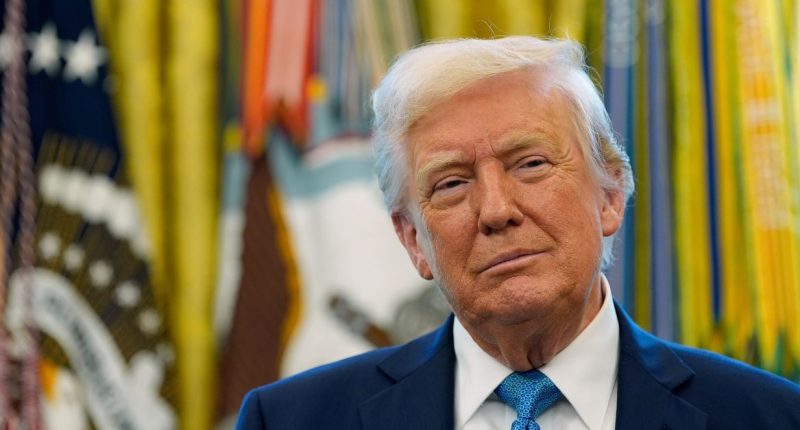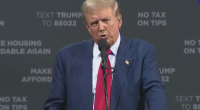Share this @internewscast.com
President Donald Trump observes the formal swearing-in of Paul Atkins as the head of the Securities and Exchange Commission in the Oval Office at the White House on Tuesday, April 22, 2025, in Washington (AP Photo/Alex Brandon).
In a rare district court triumph for President Donald Trump, a judge in Washington, D.C., on Friday permitted the government to proceed unabated with a series of executive orders targeted at dismantling “diversity, equity, and inclusion” (DEI) programs.
On February 19, the National Urban League, along with other organizations, filed a lawsuit against the Trump administration regarding a set of executive orders that terminate DEI initiatives in federal government contracts, prohibit the government from partnering with vendors that maintain internal DEI endeavors or that “acknowledge the existence of transgender individuals,” and mandate that administrative agencies recognize “only two sexes.”
In the original petition and a later-filed motion for a preliminary injunction, the plaintiffs alleged eight provisions in Trump’s anti-DEI orders ran afoul of the Fifth Amendment’s due process clause and the First Amendment’s guarantee of free speech, among other issues.
In a 58-page memorandum opinion, U.S. District Judge Timothy J. Kelly, who was appointed by Trump during his first term, rejected those claims, both procedurally and for their legal arguments.
Love true crime? Sign up for our newsletter, The Law&Crime Docket, to get the latest real-life crime stories delivered right to your inbox.
“For one reason or another, Plaintiffs’ claims are likely to fail,” the judge writes. “Some falter on standing—a prerequisite to success on the merits—and others on the underlying First and Fifth Amendment claims.”
The majority of the court’s opinion strikes a blow for the long-aggressive nature of Article III standing, which is widely understood by legal scholars as “conservative standing doctrine.”
This judicial theory was created in two cases from the 1920s by conservative judges who sought to restrain the use and limits of constitutional redress. In other words, standing doctrine was created – and has over time been honed and sustained – to limit citizens from suing the government over perceived violations of their rights. While technically procedural in nature, as opposed to relying on underlying arguments in a dispute, standing arguments are fact-intensive.
Kelly, for his part, quickly dispenses with how he views the facts in the case brought by the nonprofit organizations.
“For half the challenged provisions, Plaintiffs fail to establish a prerequisite to success on the merits: standing,” the opinion goes on. “Presidential directives to subordinates that inflict no concrete harm on private parties—or at least not on these parties—do not present a justiciable case or controversy.”
In the present case, the judge found many of the challenged provisions had to do with changing the government’s own behavior, and do not result in what, in standing doctrine legalese, is known as an “injury in fact.” This state of affairs, rather, turns the plaintiffs into “at most ‘concerned bystanders’ to internal Executive Branch processes.”
“Everything is intra-governmental,” the judge muses.
In sum, Kelly found four of the challenged provisions asked “nothing from Plaintiffs—no compliance, no changed behavior, nothing at all” because those provisions are “not aimed at them” but instead tell “only the agencies to do something.”
For the remaining four challenged provisions, however, the court determined the plaintiffs did, in fact, have standing.
But the court still rejected their arguments as legally deficient.
“Plaintiffs have not shown that the provisions threaten a protected liberty or property interest—a threshold requirement for due process claims,” Kelly’s opinion continues. “And even if they had, Plaintiffs’ vagueness challenge fails for independent reasons. The First Amendment claim, moreover, clashes with two settled rules: the government does not abridge the right to free speech by choosing not to subsidize it, and that right does not permit Plaintiffs or anyone else to violate federal anti-discrimination law.”
One of the major problems, the court says, is that the plaintiffs argued a bit too much, resting their claims on so-called “facial rather than as-applied challenges.”
In lawsuits, government action can be challenged facially, meaning in general, or as-applied, meaning in a specific circumstance.
In the present case, Kelly suggests the plaintiffs would have been better off limiting their claims to more specific problems. Instead, they argued, as the judge framed the issues, that each of the challenged anti-DEI provisions “is unconstitutional in all its applications.”
That “is a big claim,” the judge says – one that “comes at a cost.” The cost, in this case, is to show “an interest that due process protects but that the remaining Challenged Provisions threaten.”
And there, the judge says, the plaintiffs wholly failed.
“Plaintiffs have not come close to showing that most applications of the remaining Challenged Provisions will implicate protected property or liberty interests,” Kelly observes. “Indeed, they have not really tried to. All they say is that ‘a protected liberty interest . . . can’ flow from terminated contracts or grants. But they never explain how terminations under the Challenged Provisions would implicate that interest for Plaintiffs or anyone else.”















